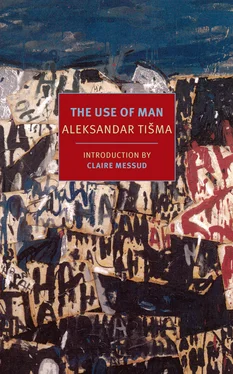Aleksandar Tišma - The Use of Man
Здесь есть возможность читать онлайн «Aleksandar Tišma - The Use of Man» весь текст электронной книги совершенно бесплатно (целиком полную версию без сокращений). В некоторых случаях можно слушать аудио, скачать через торрент в формате fb2 и присутствует краткое содержание. Год выпуска: 2014, Издательство: NYRB Classics, Жанр: Современная проза, на английском языке. Описание произведения, (предисловие) а так же отзывы посетителей доступны на портале библиотеки ЛибКат.
- Название:The Use of Man
- Автор:
- Издательство:NYRB Classics
- Жанр:
- Год:2014
- ISBN:нет данных
- Рейтинг книги:5 / 5. Голосов: 1
-
Избранное:Добавить в избранное
- Отзывы:
-
Ваша оценка:
- 100
- 1
- 2
- 3
- 4
- 5
The Use of Man: краткое содержание, описание и аннотация
Предлагаем к чтению аннотацию, описание, краткое содержание или предисловие (зависит от того, что написал сам автор книги «The Use of Man»). Если вы не нашли необходимую информацию о книге — напишите в комментариях, мы постараемся отыскать её.
A work of stark poetry and illimitable sadness,
is one of the great books of the 20th century.
The Use of Man — читать онлайн бесплатно полную книгу (весь текст) целиком
Ниже представлен текст книги, разбитый по страницам. Система сохранения места последней прочитанной страницы, позволяет с удобством читать онлайн бесплатно книгу «The Use of Man», без необходимости каждый раз заново искать на чём Вы остановились. Поставьте закладку, и сможете в любой момент перейти на страницу, на которой закончили чтение.
Интервал:
Закладка:
Similarly, though for opposite reasons, Robert Kroner sent his daughter, Vera, to Fräulein — he could not persuade his son to go — because German, or, rather, the local Austrian dialect, was his children’s mother tongue, just as Yiddish, a dialect of German, had been his own. But both dialects were corrupted, in his eyes, by unacceptable contractions and distortions — divergences from the rules, from what was correct — just as he felt his whole life had been.
Portents of disaster crept around Kroner’s house like rodents. His mother, her shaven head covered, silent, in the dark cubbyhole of her room gave herself over to prayers, fasting, and the ritual lighting of candles, as if by exaggerated zeal she could atone for the sins of her son and grandchildren, dishonored by the blood and proximity of a Gentile daughter-in-law, who had been not only a maid but a whore. And that daughter-in-law, uneducated and with an unclean past, her white body drained by hundreds of sweating nights, exhausted by countless couplings, smelling of the smoke of endless cigarettes, was useless for anything except sex — and yet no longer possible for Kroner to use for that purpose. At home, he was both prosecutor and criminal. Both there and in the office of his wholesale business next door, he experienced his divergence from the norm as a wild race of frenzied wheels under the foundations, wheels that would carry him wildly, uncontrollably to a shameful catastrophe. He closed his eyes. All the more painful to him now was the faulty speech, shrill and garish, of his children, of his wife, of his mother. The monstrousness of their verbalizing both personified and emphasized for him the underlying disorder of their behavior.
After finishing business school, Robert Kroner had spent four years in Vienna, to which he had been sent by his farseeing and generous father to be a trainee and then bookkeeper with a firm of his father’s acquaintance, Adelstädter and Son. On Saturdays, his day off, at the Burgtheater, and on weekday evenings at lectures at the Junior Chamber of Commerce, he had the opportunity to learn correct, literary German. He was quick to make use of his improved pronunciation and vocabulary whenever he went to visit his employer’s home on Sunday afternoons, chatting with the two grown daughters and young son, all seated at a little table in the living room. Behind the table stood a large bookcase containing the works of writers whose names were printed in gold letters on the spines: Körner, Goethe, Herder, Schiller. He would borrow these books to peruse during the week. Although unable to understand much of their contents — he read aloud to himself in bed before going to sleep, as if reciting a prayer learned from his mother — the disciplined succession of printed angular Gothic letters transported him into a state of profound tranquillity.
It was during this time that he decided to stay forever in dignified, orderly Vienna, even if he had to spend his whole life as a minor clerk rather than as a boss in marshy, indolent Novi Sad. Even now it seemed far away, its squat houses engulfed in mist and bulrushes like an oppressive dream. But his father fell ill, died, and after the funeral his mother held on to him, sobbing on his shoulder, and between her tears issued directions on how to conduct the business, which his father had left him in his will.
His ability to resist was broken. Now he was in despair at the backwardness into which his life had fallen, at his hopelessly bad marriage, which was perhaps the result of that despair, and finally at the muddled babble of speech into which the marriage had plunged him. By sending his daughter to this new teacher, he was extending a hand, belatedly, to the life that had eluded him.
5
Evening separation. Only Milinko Božić and his mother, Slavica, were spared that painful division of individuality. They were together in the evenings — indeed, only then were they truly together. Although from the time of his adolescence the son had been sleeping in the bedroom and the mother on a couch in the kitchen, the minute they were in bed they got going — loud enough to hear each other but not so loud the neighbors could hear — on the conversation they had not had time for during the day. “Do you have gym tomorrow?” “Do I have to get bread in the morning?” “You did less homework today than yesterday.” It was not only the words that joined them. After the words, their unspoken thoughts came together like roads that intersect, like fingers that intertwine.
At the Lazukić home, the parents were completely absorbed in each other. Klara Lazukić—straight calves, ankles swollen with age, pale puffy lids above bulging eyes, hollow cheeks, and sagging breasts — was still enthralled by having been saved from spinsterhood and by her serious, heroic savior; while Nemanja, though his wife had not fulfilled his hopes of an abundant family, could see, as in a nimbus above her head, the blessings of wealth and luxury. They lay together in bed every night and caressed each other, slowly, patiently, gently, as if the other might break, with whispered apologies, and an almost tearful parting before falling asleep. But their ministrations were more audible than they knew. For all their care, the bed sighed and moaned for a whole hour, and the parquet floor creaked at the step of the first one, then the other, as they felt their way, without switching on the light, to the bathroom, from which issued at length the splashing and hissing of water in both toilet bowl and bath. Their sons, accustomed to these noises since early childhood, had long ago arrived at the correct interpretation of their meaning. They had become simply a disturbance. Rastko, always into some novel or other, or a history of an exotic country, or news reports on wars and revolutions, scowled because they broke his concentration. Sredoje — who immediately put out his light to give himself over to dreaming — having failed to force his imagination into an almost tangible form, would burst into laughter.
Fräulein was truly alone. She listened to every noise in the darkness, thinking she could hear a mouse gnawing in the corner of the room or a cat (or perhaps burglars) creeping around in the courtyard, under the window. She thought of her father, of the people she had run into during the day (occasionally a man), and of the day to follow, with its succession of lessons. All the words she had to utter seemed to loom insurmountably high, like a soft, crumbling mountain that would collapse and bury her.
At the Kroners’, only the grandmother was alone, in her own part of the house, separated from her son’s by the vaulted gateway. She still felt herself to be living in the master’s quarters, not in this servant’s room, to which she had relegated herself of her own free will when her son announced that he was marrying and whom. Her thoughts were there, not here, her imagination stronger than her senses. She could see the daughter-in-law sprawled on the bed, legs thrown wide and hanging over the edge, the bush of red hair between them giving off the stench of the poison perfume that was choking, withering, dissolving her son (whom she could visualize only as a line of pain). Her grandson, Gerhard, who spent his days hanging around with other boys on the street, fell asleep as soon as his battered head touched a pillow.
Apart in her white room, Vera compared — like two pages of a book — the street scenes, the neighbors’ faces, the teachers’ reprimands, the children’s shouts, with the faces and behavior of the members of her own household and came to the painful conclusion that an abyss lay between the two. What should she do for it to be bridged, to be filled in? She sensed that something vague, something hidden would never allow that to take place, that making of peace.
Читать дальшеИнтервал:
Закладка:
Похожие книги на «The Use of Man»
Представляем Вашему вниманию похожие книги на «The Use of Man» списком для выбора. Мы отобрали схожую по названию и смыслу литературу в надежде предоставить читателям больше вариантов отыскать новые, интересные, ещё непрочитанные произведения.
Обсуждение, отзывы о книге «The Use of Man» и просто собственные мнения читателей. Оставьте ваши комментарии, напишите, что Вы думаете о произведении, его смысле или главных героях. Укажите что конкретно понравилось, а что нет, и почему Вы так считаете.












